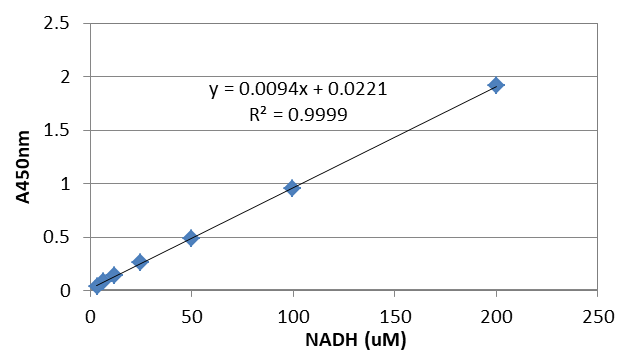Amplite® Colorimetric Phosphofructokinase (PFK) Activity Assay Kit
The Amplite® Colorimetric Phosphofructokinase (PFK) Activity Assay Kit provides a simple and direct procedure for precise measurement of PFK enzyme activity in various biological samples. This kit is based on a coupled enzyme assay, in which fructose-6-phosphate in the presence of ATP is converted to fructose1,6-diphosphate and ADP by PFK enzyme. This ADP is then converted to AMP and NADH by an enzyme mix. The resulting NADH reduces a colorless substrate to a colored product which absorbs at 450 nm and is proportional to the PFK activity present. One unit (U) is the amount of enzyme that catalyzes the reaction of 1 µmol of substrate per minute. Phosphofructokinase (PFK) is an enzyme of glycolysis pathway catalyzing the conversion of fructose-6-phosphate to fructose-1,6-diphosphate. This is a crucial step of glycolysis as this reaction determines the overall rate of glycolysis. PFK enzyme activity is regulated by multiple cofactors and post-translational modifications. Deficiencies in PFK activity are linked to a rare genetic disorder known as glycogen storage disease type VII (GSD-VII), also known as Tarui disease. Additionally, deficiencies in PFK activity may also contribute to exercise-induced myopathy and rhabdomyolysis in certain individuals.


| Catalog | Size | Price | Quantity |
|---|---|---|---|
| 11329 | 100 Tests | Price |
Storage, safety and handling
| H-phrase | H303, H313, H333 |
| Hazard symbol | XN |
| Intended use | Research Use Only (RUO) |
| R-phrase | R20, R21, R22 |
| Storage | Freeze (< -15 °C); Minimize light exposure |
| UNSPSC | 12352200 |
Instrument settings
| Absorbance microplate reader | |
| Absorbance | 450 nm |
| Recommended plate | Clear bottom |
Contact us
| Telephone | |
| Fax | |
| sales@aatbio.com | |
| International | See distributors |
| Bulk request | Inquire |
| Custom size | Inquire |
| Technical Support | Contact us |
| Request quotation | Request |
| Purchase order | Send to sales@aatbio.com |
| Shipping | Standard overnight for United States, inquire for international |
Page updated on January 29, 2026
